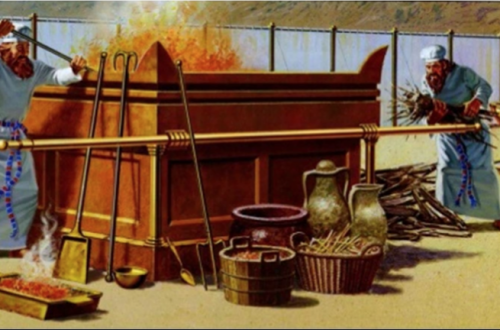The Resurrection of Jesus Christ (Part II)
“[I]f Christ has not been raised, our preaching is useless and so is your faith. More than that, we are then found to be false witnesses about God, for we have testified about God that he raised Christ from the dead…. And if Christ has not been raised, your faith is futile; you are still in your sins. Then those also who have fallen asleep in Christ are lost” (1 Corinthians 15:14-18, NIV 1984).
Once again we are examining the foundational cornerstone of Christianity: the resurrection of Jesus Christ. (Click here to read the first part of this study.) The resurrection of Jesus is central to all Christian belief, as one can see by the above words of the Apostle Paul. To deny the physical resurrection of Jesus Christ from the dead is, quite simply, to not be a Christian.
So let us continue looking at reasons Christians have for believing in the literal, factual, and historic resurrection of Jesus Christ from the dead:
From the beginning the testimony of the disciples was that Jesus had risen from the dead. The disciples testified they were eyewitnesses to these events. In Peter’s first sermon, he said, “God has raised this Jesus to life, and we are all witnesses of the fact” (Acts 2:32, NIV 1984, emphasis added). He repeated this in another sermon: “You killed the author of life, but God raised him from the dead. We are witnesses of this” (Acts 3:15, NIV 1984). Later, to the very same group of leaders who handed Jesus over to be crucified, Peter spoke boldly of “Jesus Christ the Nazarene whom you crucified, whom God raised from the dead” (Acts 4:10). Later he tells them, “. The God of our forefathers raised up Jesus, whom you seized and killed by hanging him on a tree…. And we are witnesses of these events” (Acts 5:30 & 32, emphasis added).
The disciples were witnesses testifying to what they had seen firsthand: “[T]he apostles continued to testify to the resurrection of the Lord Jesus” (Acts 4:33, NIV 1984). “We are witnesses of everything he did in the country of the Jews and in Jerusalem. They killed him by hanging him on a tree, but God raised him from the dead on the third day and caused him to be seen. He was not seen by all the people, but by witnesses whom God had already chosen—by us who ate and drank with him after he rose from the dead” (Acts 10:39-41, NIV 1984, emphasis added). “[W]e have seen and testify” (1 John 1:2, emphasis added).
We also have the testimony of Paul, whose writings predate the Gospels as being the earliest New Testament manuscripts. What did Paul write? Well, Paul was consistent: “We know that… Christ has been raised from the dead” (Romans 6:9). “Christ has indeed been raised from the dead” (1 Corinthians 15:20, NIV 1984). “From Paul, an apostle (not from men, nor by human agency, but by Jesus Christ and God the Father who raised him from the dead)” (Galatians 1:1). “Remember Jesus Christ, raised from the dead, a descendant of David; such is my gospel” (2 Timothy 2:8).
Paul wrote about the eyewitnesses of the resurrected Christ and mentions that most of the eyewitnesses were still alive (in case anyone wanted to check into it):
“For I passed on to you as of first importance what I also received – that Christ died for our sins according to the scriptures, and that he was buried, and that he was raised on the third day according to the scriptures, and that he appeared to [Peter], then to the twelve. Then he appeared to more than five hundred of the brothers and sisters at one time, most of whom are still alive, though some have fallen asleep. Then he appeared to James, then to all the apostles” (1 Corinthians 15:3-7, emphasis added).
It is believed that these words Paul wrote (above) were part of a creed, since Paul told his readers that he “received” it and had “passed on” to the Christians in the city of Corinth. If this is a creed, then it must have arisen within years of Christ’s crucifixion. In another possible creed Paul writes, of Christ, “He is the head of the body, the church, as well as the beginning, the firstborn from among the dead, so that he himself may become first in all things” (Colossians 1:18, emphasis added). These are very early writings which show Jesus’ resurrection was being taught as soon as Christianity arrived on scene.
The resurrection of Jesus was Paul’s main thrust: “And we proclaim to you the good news about the promise to our ancestors, that this promise God has fulfilled to us, their children, by raising Jesus,” Paul preaches in an early sermon. “But regarding the fact that he has raised Jesus from the dead…” (Acts 13:32-4). “[Paul] was proclaiming the good news about Jesus and the resurrection” (Acts 17:18). A person describing one of Paul’s trials said, “When his accusers stood up, they did not charge him with any of the evil deeds I had suspected. Rather they had several points of disagreement with him about their own religion and about a man named Jesus who was dead, whom Paul claimed to be alive.” (Acts 25:18-19).
The evidence of the empty tomb.
Now here is the interesting thing, a great deal of the disciples’ preaching, especially early on, took place in Jerusalem. Would this make sense if the body of Jesus was still in the tomb? One author, stressing the empty tomb, points out how the initial explosion of converts to Christianity took place in Jerusalem “where no real illusions could prevail, where anybody could go and see the tomb between supper and bedtime, and where an overwhelming body of official, authoritative and conclusive witnesses existed.”[i]
It appears no one ever argued that the body of Jesus was still in the tomb. Of course, this does not prove Jesus rose from the dead, it simply proves that no detractors from Christianity could say, “Look, here’s the tomb and here’s the body, these guys are liars!” That was never an accusation against early Christianity. And there would be no reason for the enemies of Christ and Christianity to keep the body hidden away as the number of Christians grew daily. So the accusation arose that Jesus’ disciples moved the body themselves.[ii] But does such a charge really make sense? Again, this charge takes us back to the idea that, at the very least, Christ’s original disciples were the perpetrators of one of the greatest frauds and deceptions in all of history; that all the while, knowing that Jesus was still dead, they went out and preached that He was risen, and they had all seen Him.
Consider Paul’s meeting in Jerusalem, with the disciples Peter and James, three years after the crucifixion.[iii] If the resurrection were not true then it would mean that Peter, James, and Paul were all meeting in order to continue perpetuating this fraud. Then again, each had apparently seen the risen Jesus separately; so, “[I]f there were no resurrection it must be admitted by radical critics that Paul deceived the apostles of an actual appearance of Christ to him, and they in turn deceived Paul about the appearances of the risen Christ to them.”[iv] That’s a whole lot of deceiving going on.
Another major factor in considering whether Jesus really did rise from the dead is the change that overcame the original disciples. I already mentioned about how Peter spoke boldly against the very leaders who gave Jesus over to be crucified. This is the same Peter who less than two months before, when Jesus was arrested, denied three times that he knew Jesus.[v] These were the same disciples who fled from arrest when Jesus was arrested and hid out after Jesus had died for fear they would be next.[vi] These guys knew Jesus had been executed and died. One of them had been at the cross and personally witnessed Jesus’ death.[vii] Why then, suddenly, did they change the narrative? And why did their demeanor make a 180 degree turn?
“[The] fact is that… six or seven weeks [after the crucifixion] a profound conviction came to the little group… a change that attests to the fact that Jesus had risen from the grave…. It is not… one or two emotional women…. It is… the whole party, including the nine who had fled at the arrest, and certain independent persons who [had] not previously come into the story…”[viii]
Another extremely important question is why these men and women, Jews, suddenly dropped the major tenets of Judaism? As one person pointed out, within two months of Jesus being crucified, thousands of Jews were following this new belief system, and they were “willing to give up or alter all five of the social institutions that they [had] been taught since childhood [had] importance both sociologically and theologically.”[ix]
1. They immediately walked away from the sacrificial laws God gave to Moses.
2. They immediately walked away from a great number of Jewish law observances.
3. They changed the day of worship from the Sabbath (Saturday) to the first day of the week (Sunday), the day Jesus rose from the dead.[x]
4. They changed the idea of the Messiah as being a political king and savior to His being the Eternal King and the Savior from sin.
5. They changed from the Jewish monotheistic idea to a Trinitarian or triune monotheism.
“[R]emember, they were Jews themselves! Keeping in mind what they thought would happen if they were wrong, we must recognize that this was one of the biggest decisions any religious body of men have ever made!”[xi]
In light of all this, let’s return to Paul for a moment:
Paul’s conversion also helps lend credence to the fact of Jesus’ resurrection. One has to remember just how zealously Jewish Paul was. As he preached: “I am a Jew… educated with strictness under Gamaliel according to the law of our ancestors, and was zealous for God…. I persecuted this Way even to the point of death, tying up both men and women and putting them in prison, as both the high priest and the whole council of elders can testify about me” (Acts 22:3-5).
Yes Paul had originally hated Christianity and Christians; yet he converted to their side overnight (so to speak). Paul writes that he was “circumcised on the eighth day, from the people of Israel and the tribe of Benjamin, a Hebrew of Hebrews. I lived according to the law as a Pharisee. In my zeal for God I persecuted the church. According to the righteousness stipulated in the law I was blameless” (Philippians 3:5-6) “For you have heard of my former way of life in Judaism,” he writes in another letter, “how I was savagely persecuting the church of God and trying to destroy it. I was advancing in Judaism beyond many of my contemporaries in my nation, and was extremely zealous for the traditions of my ancestors” (Galatians 1:13-14). Would he have converted knowing that Christ’s body was still in the tomb or that the disciples stole the body? How could he have thrown off so many of the Jewish traditions, institutions, and laws? How could he have abandoned his whole privileged previous way of life? Would anything short of seeing the resurrected Jesus Christ have changed him from a person “breathing out threats to murder the Lord’s disciples” (Acts 9:1) to actually being one of them? “He once approvingly watched as [the disciple] Stephen was brutally murdered; now he was willing to be murdered for the same Christian testimony.”[xii] As Paul wrote, “I want to know Christ and the power of his resurrection and the fellowship of sharing in his sufferings, becoming like him in his death” (Philippians 3:10, NIV). And this was the attitude of many Christian believers.
In part III of “The resurrection of Jesus Christ” we will examine at least one more reason why Christians believe the resurrection was a factual, historic event. I also expect to deal with one or two false ideas to which the faux-Christian churches hold.
“[I]f you confess with your mouth that Jesus is Lord and believe in your heart that God raised him from the dead, you will be saved” (Romans 10:9).
Click here if you would like to read “The Resurrection of Jesus Christ, part 1”.
Click here if you would like to read “The Resurrection of Jesus Christ, part 3”.
_______________________
[i] Frank Morison, Who Moved the Stone?, published by Lamplighter Books, chapter entitled “The Historic Crux of the Problem,” page 114.
[ii] Matthew 27:64, Matt. 28:13.
[iii] Acts 9:26-28, Galatians 1:18-19.
[iv] Bernard Ramm as quoted in Evidence for Christianity, Historical Evidences for the Christian Faith, copyright 2006 by Josh McDowell, Thomas Nelson Publishers, chapter entitled “The Resurrection—Hoax or History,” page 306.
[v] John 18:15-26.
[vi] Mark 14:50-52, John 20:19.
[vii] John 19:35.
[viii] Frank Morison, Who Moved the Stone?, published by Lamplighter Books, chapter entitled “The Historic Crux of the Problem,” page 104.
[ix] J.P. Moreland quote from The Case for Christ, A Journalist’s Personal Investigation of the Evidence for Jesus, copyright1998 by Lee Strobel, Zondervan Publishing, chapter entitled “The Circumstantial Evidence,” page 250.
[x] Luke 24:1, John 20:19, Acts 20:7, 1 Cor. 16:2, etc.
[xi] Michael Green as quoted in Evidence for Christianity, Historical Evidences for the Christian Faith, copyright 2006 by Josh McDowell, Thomas Nelson Publishers, chapter entitled “The Resurrection—Hoax or History,” page 314.
[xii] Hank Hanegraaff, The Third Day, copyright 2003 Hank Hanegraaff, W Publishing, page 47.



